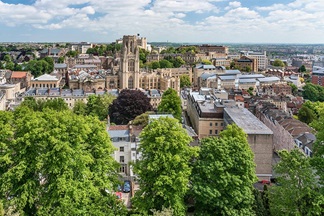In the wake of assessments under PAS 9980, the council is investing in substantial fire safety improvements for all of its tower blocks, reports Ron Alalouff. Following an inspection programme using PAS 9980:2022 – the code of practice for fire risk appraisals of external wall construction and cladding for existing multi-storey residential buildings – Bristol City Council is to spend £96 million on fire safety improvement work on its properties.
The proposals – due to be voted on at a full council meeting – include the removal of dangerous cladding and the installation of sprinkler systems and fire alarm systems.
The purpose of appraisals under PAS 9980 is to assess the risk to occupants from fire spreading over or within external walls, and decide whether remediation or other mitigating measures are needed. The council has so far conducted assessments of the external wall system on three blocks in Bristol, which concluded that the presence of Expanded Polystyrene (EPS) elevates the fire safety risk in the buildings.
The total cost of fire safety works is £96 million over the next 10 years, compared to the original £21m previously allocated before the PAS 9980 assessments. The council suffered two fires in high rise blocks over the last few months, in one of which the cladding in the stairwell contributed to the spread of fire.
The following additional programmes of work are now included in the council’s 2023/24 Housing Investment Plan:
• The removal and replacement of all EPS cladding over the next 10 years, at a cost of £46 million. Until the cladding is removed or the council receives specialist fire safety advice to the contrary, simultaneous evacuation policies under the National Fire Chiefs Council’s Simultaneous Evacuation Guidance will remain in place, supported by either a waking watch or an appropriate alarm system.
• Waking watch patrols are in place in 38 blocks where there are concerns about the cladding, and will be used as a relatively short-term measure where EPS cladding can be removed in the next 12 months. Costs were previously estimated to be £12.4 million over two years, but have been re-evaluated downwards since a December 2022 report.
• Where the cladding removal work is scheduled to take longer, the council plans to replace the waking watch with common fire alarm systems under BS 5839-1, at a cost of £8.7 million.
• The installation of sprinkler systems across all 62 high-rise blocks over a five year period at a cost of £32.7 million, plus a servicing and maintenance budget of around £23.7 million over 30 years (around £10,000 a year per block).
The investment in fire safety inevitably comes at a cost to other housing budgets, including the scrapping of planned refurbishment of garage sites, the extension of the laundry refurbishment programme by six years, and the postponement of cyclical projects of major refurbishment. Council rents are also planned to rise by 7%.
The announcement follows a campaign led by the housing action group Acorn involving residents, council leaders and the media to install sprinkler systems in all of the council’s tower blocks, and implement waking watches as an interim measure.
“The very least we want from a home is a safe place to go to sleep,” said Nick Ballard, Acorn Head Organiser. “Sadly for the residents of these Bristol tower blocks, this wasn’t the case. That’s why they got together and organised with Acorn and fought for these fire safety measures. We’re delighted that Bristol City Council has now chosen to invest in the safety of their residents.
“It’s a national disgrace that tower blocks across the country are still covered in dangerous cladding and don’t have adequate fire safety measures in place, and we will fight until we see a country where nobody is at risk of losing their home or losing their lives through avoidable tragedy. We want to see other local authorities follow the example of Bristol City Council and put the safety of their residents first.”








